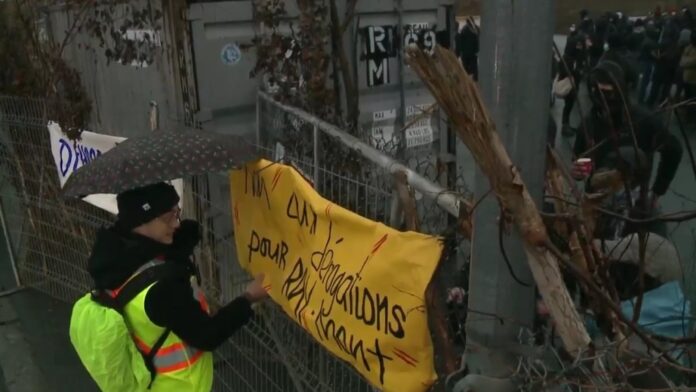Residents of Hochelaga-Maisonneuve Resist Expansion Plans by Ray-Mont Logistics
Residents of Montreal’s Hochelaga-Maisonneuve neighborhood are raising their voices in protest against the proposed expansion of Ray-Mont Logistics, a logistics and shipping company seeking to establish a container shipment yard near their homes. On a Thursday morning, local residents took to the streets and blocked access to the container yard, expressing a strong sentiment against the impending project.
Community Concerns
The proposed site for the container yard is located on Notre Dame Street East, alarmingly close to residential areas—approximately one hundred meters from homes. This proximity has sparked fears among residents regarding potential increases in truck traffic, deteriorating air quality, and a surge in noise pollution. Anais Houde, a spokesperson for the protesters, articulated their collective sentiment clearly: “We are never going to accept its presence in our neighbourhood.” Many residents share the concern that the operations of a shipping yard could lead to a disruptive environment that adversely affects their quality of life.
Concerned resident Josée Desmeules raised additional issues regarding public health and safety. She highlighted an anticipated problem with vermin, stating, “There are going to be vermin that will be attracted because they [Ray-Mont Logistics] are going to be handling cereals and grains.” Such concerns resonate deeply within the community, raising alarm about a fundamental shift in the nature of their neighborhood.
History of Opposition
This conflict over Ray-Mont Logistics’ operations isn’t new; it has been a topic of contention for several years. In 2017, the City of Montreal denied the company’s permit request. However, in a surprising turn of events the following year, a Quebec court ruled in favor of Ray-Mont Logistics, allowing the company to proceed with its plans. This legal victory gave the company the green light to expand its operations, despite continued opposition from local residents.
Adding to the community’s dismay is the company’s recent request to extend its operating hours. Desmeules articulated her discomfort further, lamenting the lack of access to the shores that have been “occupied by the containers of the Port of Montreal that settled in our borough over the last 50 years.” This history of industrial encroachment deepens the residents’ desire to protect their community from further degradation.
Company’s Justification
In response to the community’s protests, Ray-Mont Logistics issued a statement asserting its commitment to operating within regulatory frameworks. The company argues that its long-term goal is to relocate operations closer to the Port of Montreal, claiming that such a move would significantly reduce trucking distances by 88 percent, cut emissions by 82 percent, and decrease heavy truck traffic on Notre Dame Street by one-third. While these assertions may sound beneficial from a logistical standpoint, local residents remain skeptical about the company’s claims of improved air quality and reduced truck traffic.
Limited Options for Residents
Given the court’s decision that compelled the city to approve the necessary zoning changes for Ray-Mont Logistics’ expansion, the city’s hands are tied. Despite the upcoming public consultations intended to allow residents to voice their concerns, the likelihood of altering the project’s trajectory seems grim. Desmeules reflected on this frustrating situation, stating, “It’s difficult to think about it. I prefer to continue to fight.”
A Persistent Fight
Despite police dismantling their barrier roughly an hour after its installation, the resolve of the protesters remains strong. The residents of Hochelaga-Maisonneuve, unified in their efforts, are determined not to let this issue fade quietly into the background. Their commitment to advocacy speaks volumes about their desire to protect their neighborhood from industrial encroachment and maintain the integrity of their community. As they continue their battle, it becomes clear that the struggle for local voices in urban development is far from over.
The unfolding events in Hochelaga-Maisonneuve remind us of the often fraught relationship between communities and commercial interests—a tension that will likely be part of ongoing dialogues in urban spaces across the globe.














